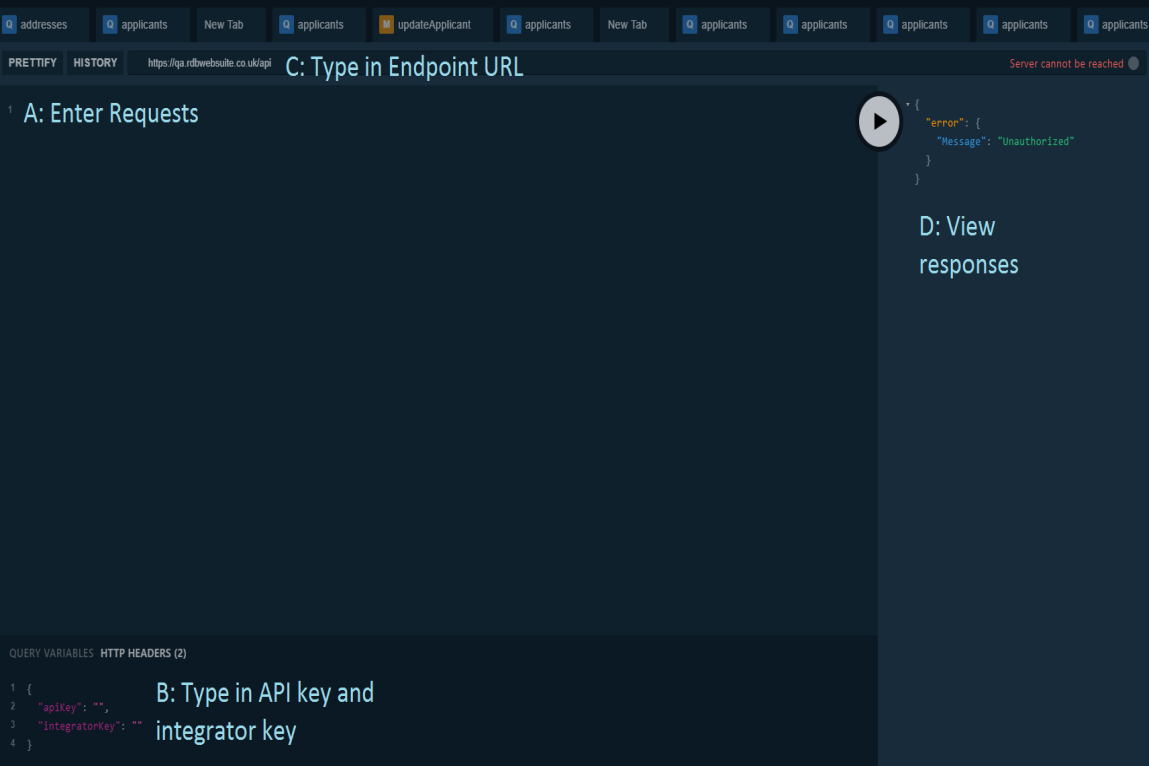Connecting to a GraphQL Endpoint
You connect to a GraphQL endpoint in order to make requests to the API. You can make GraphQL requests in different ways depending on the programming language and environments that you are familiar with (see Methods for Making Requests).
For testing purposes, you can use the GraphQL IDE as provided with the Recruitment CRM regardless of your development environment. The IDE also provides supplementary documentation and a list of the entire schema. For more information, see Using the IDE.
About the GraphQL Endpoint
Access would have provided you with a GraphQL endpoint URL in order to make queries. As GraphQL uses a single endpoint, this is the only endpoint you will need to use.
About the API Key and Integration Key
You require an API key and integration key to ensure that requests are made securely over the internet. The API key and integration key need to be entered in the appropriate locations in your development environment. These keys would have been supplied by Access.
Using the IDE
To use the API in the IDE, do the following:
- Browse to this URL.https://prodtest.accessrdb.com/graphql.html.
- In the displayed IDE, fill in details in the various sections.

Notes
- Once a request is made, e.g. your first request, you can view the documentation for the different requests through the displayed DOCS tab. You can also access the GraphQL schema through the SCHEMA tab.

- For quick access to previous requests, you can click the History item.
Methods for Making Requests
In your development environment. you can make requests in the following ways:
- Through client libraries such as Apollo
- By sending JSON
- By sending raw GraphQL queries
Client libraries work with most modern frameworks for developing web applications, including those for mobile platforms.
Note:Examples of raw GraphQL queries are provided in these pages.
Sending JSON
When sending requests as JSON, you must ensure that the "Content-Type" header is set to , application/json. You will need to create queries in the JSON format as shown in this example. In this example, you add the key-value pair of , "applicant-name":"tim"to $applicant_name.
{
"query": "applicants(quicksearch $applicant_name) }
applicant {
applicantId
applicantName
applicantSurname
}",
"variables": {
"applicant-name":"tim"
}
}
Sending Raw GraphQL
With any other tool using GraphQL, you must set the "Content-Type" header to application/graphql.You will need to create queries in GraphQL format as shown in this example.
{
applicants(quickSearch:"tim"){
applicant {
applicantId
applicantName
applicantSurname
}
}
}
See Also
Connecting to a GraphQL Endpoint
Using the GraphQL API with Recruitment CRM